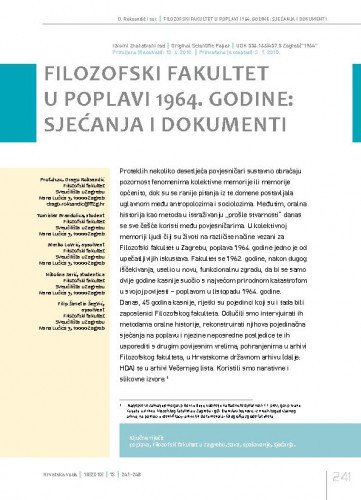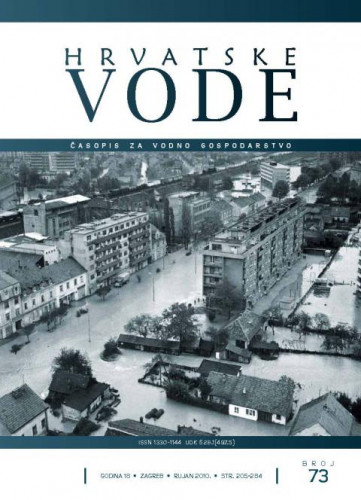Proteklih nekoliko desetljeća povjesničari sustavno obraćaju pozornost fenomenima kolektivne memorije ili memorije općenito, dok su se ranije pitanja iz te domene postavljala uglavnom među antropolozima i sociolozima. Međutim, oralna historija kao metoda u istraživanju „prošle stvarnosti“ danas se sve češće koristi među povjesničarima. U kolektivnoj memoriji ljudi čiji su životi na različite načine vezani za Filozofski fakultet u Zagrebu, poplava 1964. godine jedno je od upečatljivijih iskustava. Fakultet se 1962. godine, nakon dugog iščekivanja, uselio u novu, funkcionalnu zgradu, da bi se samo dvije godine kasnije suočio s najvećom prirodnom katastrofom u svojoj povijesti – poplavom u listopadu 1964. godine. Danas, 45 godina kasnije, rijetki su pojedinci koji su i tada bili zaposlenici Filozofskog fakulteta. Odlučili smo intervjuirati ih metodama oralne historije, rekonstruirati njihova pojedinačna sjećanja na poplavu i njezine neposredne posljedice te ih usporediti s drugim povijesnim vrelima, pohranjenima u arhivi Filozofskog fakulteta, u Hrvatskome državnom arhivu (dalje: HDA) te u arhivi Večernjeg lista. Koristili smo narativne i slikovne izvore..; In the past several decades, historians are systematically paying attention to the phenomena of collective memory and memory in general, whereas earlier the questions related to this area were mostly dealt with by anthropologists and sociologists. However, oral history as a method of researching “past reality“ is increasingly used today by historians as well. In the collective memory of persons whose lives are connected, in different ways, to the Faculty of Philosophy in Zagreb, the flood of 1964 is one of the more memorable experiences. In 1962, after a long wait, the Faculty moved into a new, functional building, only to face, two years later, the greatest natural disaster in its history – the flood of October 1964. Today, 45 years later, only rare individuals are still employed by the Faculty of Philosophy. We decided to interview them by using oral history methods, reconstruct their individual memories of the flood and its immediate consequences and compare it with other historical resources stored in the archives of the Faculty of Philosophy, Croatian State Archives (CSA) and the archives of the daily Večernji list. We used both narrative and visual sources.
Sažetak
Dio sveska

